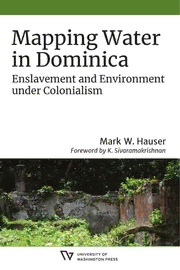Table Of ContentMapping Water in Dominica
Culture, Place, and Nature
Studies in Anthropology and Environment
K. Sivaramakrishnan, Series Editor
Centered in anthropology, the Culture, Place, and Nature series encompasses new
interdisciplinary social science research on environmental issues, focusing on the
intersection of culture, ecology, and politics in global, national, and local contexts.
Contributors to the series view environmental knowledge and issues from the
multiple and often conflicting perspectives of various cultural systems.
Mapping Water in Dominica
Enslavement and Environment under Colonialism
•
Mark W. Hauser
University of Washington Press
Seattle
Mapping Water in Dominica was made possible in part by grants from the
Andrew W. Mellon Foundation and Northwestern University Libraries.
Copyright © 2021 by the University of Washington Press
Design by Copperline Book Services Inc.
Typeset in Garamond Premier Pro by PageMajik
25 24 23 22 21 5 4 3 2 1
Printed and bound in the United States of America
The digital edition of this book may be downloaded and shared under a Creative
Commons Attribution Non-commercial No derivatives 4.0 international
license (CC-BY-NC-ND 4.0). For information about this license, see https://
creativecommons.org/licenses/by-nc-nd/4.0. To use this book, or parts of this book,
in any way not covered by the license, please contact University of Washington
Press. This license applies only to content created by the author, not to separately
copyrighted material.
University of Washington Press
uwapress.uw.edu
Color versions of the maps are available at DOI 10.6069/9780295748733.s01.
Library of Congress Cataloging-in-Publication Data on file
ISBN 978-0-295-74871-9 (hardcover)
ISBN 978-0-295-74872-6 (paperback)
ISBN 978-0-295-74873-3 (ebook)
This book is published as part of the Sustainable History
Monograph Pilot. With the generous support of the
Andrew W. Mellon Foundation, the Pilot uses cutting-edge
publishing technology to produce open access digital editions
of high-quality, peer-reviewed monographs from leading
university presses. Free digital editions can be downloaded
from: Books at JSTOR, EBSCO, Hathi Trust, Internet
Archive, OAPEN, Project MUSE, and many other open
repositories.
While the digital edition is free to download, read, and share,
the book is under copyright and covered by the following
Creative Commons License: BY-NC-ND 4.0. Please consult
www.creativecommons.org if you have questions about your
rights to reuse the material in this book.
When you cite the book, please include the following
URL for its Digital Object Identifier (DOI):
https://doi.org/10.6069/9780295748733
We are eager to learn more about how you discovered this
title and how you are using it. We hope you will spend a few
minutes answering a couple of questions at this url:
https://www.longleafservices.org/shmp-survey/
More information about the Sustainable History Monograph
Pilot can be found at https://www.longleafservices.org.
To Jean and Bill Hauser for the questions they taught me to ask
•
Contents
Foreword by K. Sivaramakrishnan ix
Acknowledgments xiii
Timeline xvii
Introduction
Welcome to Nature’s Island 1
WATERSCAPES
Chapter 1
Mapping Slavery’s Material Record 11
PROPERTIES
Chapter 2
Mapping Caribbean Waterways 47
Chapter 3
Mapping the Sugar Revolution 79
CULTIVATION
Chapter 4
Mapping Peripheral Flows 119
Chapter 5
Mapping Belongings 155
Epilogue
Presenting Predicaments 189
Notes 195
Bibliography 219
Foreword
Modern colonial empires were built in many places in the world by the simul-
taneous capture of human labor (in the form of slaves, indentured servants, in-
debted workers, and sharecroppers) and natural endowments (in the form of
soil-water relations and varied nonhuman life) for the production of agricul-
tural commodities exported to distant lands in service of global markets. In this
book, we encounter one set of such capture processes in one Caribbean loca-
tion, an island, that was the site of historical and archaeological research that
informs the work.
Centered on the sugar economy that emerged in eighteenth-century Domi-
nica to serve a world demand for sweetness, and on the power relations it forged,1
Mark Hauser’s wonderful study covers the environmental conditions in which
sugar plantations, slave systems, and struggles over water and soil formed in the
modern Caribbean. As an archaeologist writing colonial history, he brings tal-
ents and perspectives to this work that are often not found, even in some of the
more careful historical studies. At the same time, he offers welcome analysis of
the gradual, fitful, and often unpredictable ways in which local economies en-
counter global pressures and flows, and traces more precisely the transformations
that are swept into current, rather un-nuanced, discussions of the Anthropocene
and its variants, such as the Plantationocene.2
As Hauser notes, precolonial empires were built, particularly in the Amer-
icas, by directing local agriculture, and its command over water resources,
to the production of crops and goods that served the purposes of large-scale
polity building. In that sense, the arrival of Europeans in the Caribbean and
the harnessing of land, water, and labor to the production of sugar and other
crops for the world commodities market was another wave of such disposses-
sion, redirection, and capture. It included the loss of many freedoms among
the local communities and the importation of others in servitude, this time
from Africa. To document this process—the ecological relations with which
the production and decline of plantations are enmeshed—Hauser focuses on
three issues: scarcity, mobility, and ideas of belonging. After discussing the
material record of slavery and providing a description of the water channels
ix

